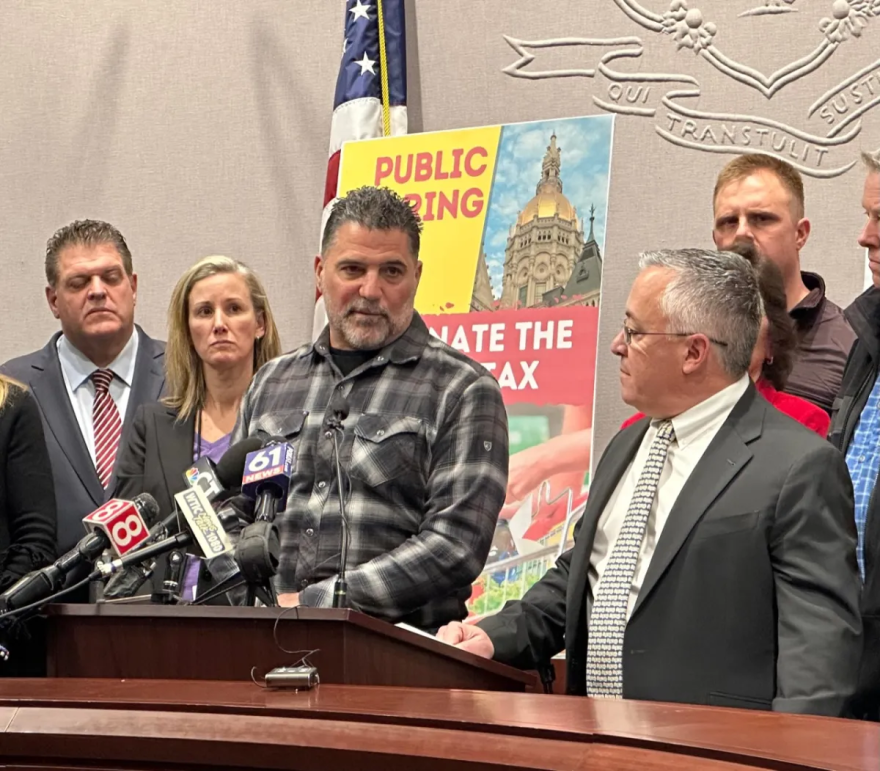Gov. Ned Lamont rejected calls Wednesday by business owners and House Republicans to pause the collection of a new mileage tax on tractor-trailers that raised $4.3 million in its first month, the majority from out-of-state truckers.
“You got to pay your bills in life,” Lamont said. “We’ve got a lot of expense when it comes to roads and bridges.”
Starting Jan. 1, carriers using tractor-trailers have to pay between 2.5 cents and 17.5 cents for every mile driven in Connecticut, with the fee dependent on the gross weight of the vehicle.
The new tax is projected to eventually produce $7.5 million a month, or $90 million a year, for the special transportation fund, which collected about $2 billion in 2022, mostly in sales tax and fuel tax revenues.
The fund is projected to run a surplus for at least the next several years.
“We don’t need this money now. So let’s take a pause and have a smart conversation,” said Rep. Holly Cheeseman, R-East Lyme.
House Bill 5290, a GOP proposal up for a public hearing Friday by the Finance, Revenue and Bonding Committee, would end collection of the tax on July 1.
Senate Bill 350, which was introduced by Sen. Cathy Osten, D-Sprague, would exempt all vehicles transporting agricultural commodities, machinery or supplies from the tax. It had a hearing last month. Trucks carrying milk to and from dairy farms already are exempt.
The Democratic-controlled legislature passed the truck mileage tax at Lamont’s request last year, two years after he failed to win approval of highway tolls, a far bigger revenue source pitched at a time when the transportation fund was approaching insolvency.
Republicans objected to the mileage tax on two counts: They said it would add to the costs of most shipped consumer goods, including groceries, and it might prove hard to collect from out-of-state truckers.
Nearly 90% of the first-month mileage reports and 76% of the revenues came from out-of-state truckers, according to data provided by the Lamont administration. The reports and payments for January were due Feb. 28.
The $4.3 million in first-month revenues — $3.3 million from out-of-state carriers and $1 million from in-state — was well below the projections calculated by the legislature’s Office of Fiscal Analysis, but the trucking industry noted the state only began notifying carriers of the new fee in November.
All but 2,200 of the first 19,500 mileage reports came from out of state, including 1,200 from Canada, the administration said. Connecticut is one of only five states with a truck mileage tax, though Republicans say about 20 others once had them.
With diesel fuel costing an average of $4.67 a gallon in Connecticut, about 30 cents higher than the national average, truckers at a GOP press conference complained that the new tax is another expense in a high-cost state.
“We’ve had to hire an additional employee to help just administer this tax itself,” said Brennan Sheahan of Connecticut Mulch, which has 40 trucks on the road most days. “We have to pay, we’re estimating, over $150,000 in taxes coming off the bottom line of the company.”
One of the trucking company owners standing with the Republicans on Wednesday was Dave Palumbo, the Democratic town chair of North Branford, the home of the House Republican minority leader, Vincent J. Candelora.
“I think this bill was really shoved down our throats without any real talk about how is it going to impact us,” said Palumbo, the owner of Palumbo Trucking.
Palumbo, 57, said he started with one borrowed truck and now owns nearly 100, plus rail terminals in New Haven, Wallingford and Middletown. His company specializes in transporting cement powder.
He came with a list of expenses, including $35,000 in annual registration fees for his trucks.
“You look at the highway use tax we’re paying right now,” he said. “For this month alone, it was, you know, $4,000.”
He has been passing on the cost to customers, but a quirk in the law may put him at a competitive disadvantage. The law applies only to “multi-unit” trucks, meaning tractors pulling trailers or tankers.
One of his customers, Richard Fitzgerald of Blakeslee, a manufacturer of precast concrete products in Branford, is also served by a supplier who uses trucks not subject to the tax, Palumbo said.
“I have 4,000 to 5,000 loads to his facility. He has another trucking company that has triaxial dump trucks that can haul to his facility, 2,500 loads a year,” Palumbo said. “They don’t pay the tax. I have to pay the tax.”

On the same day Republicans were calling for a suspension of the mileage tax, Lamont held a press conference at a coffee shop in Glastonbury to promote his proposal to cut the income tax.
“I like to think that that’s going to make a real difference,” Lamont said. “We still have some lingering inflation, we still have issues to deal with, still have the high cost of energy. I like to think that an extra 20 or 30 bucks in your paycheck starting January 1 of next year will make a real difference.”
One of the lawmakers joining him at the coffee shop was Rep. Steve Weir, R-Hebron, whose district includes a small piece of Glastonbury. He said he is interested in any bill that can lower the cost of living in Connecticut.

